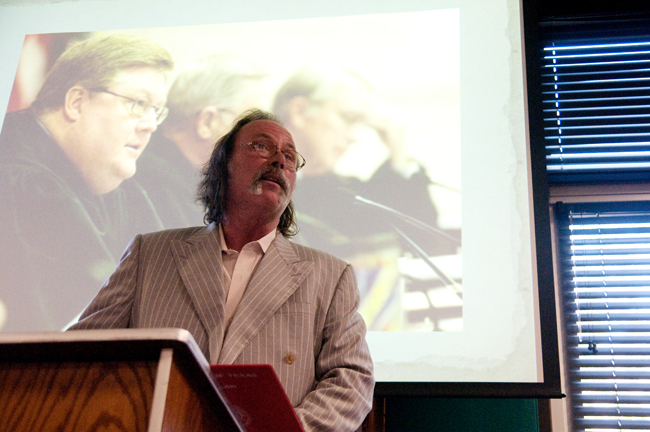For the last six years, former Supreme Court Justice Sandra Day O’Connor has traveled the country, promoting the idea that state judicial elections lead to corruption and a decline in the Supreme Court’s institutional legitimacy. A speaker on campus Tuesday disagreed.
James Gibson, a Washington University in St. Louis government professor, spoke to an audience of approximately 60 people Tuesday as part of the first installment of this year’s Human Rights Happy Hour Speaker Series, which is hosted by the Bernard and Audre Rapoport Center for Human Rights and Justice. Though past speakers have focused on international judicial issues, this year the series has a more domestic focus, said associate government professor Daniel Brinks, who moderated Tuesday’s event.
“It’s important for students as citizens to be well-informed, especially about things that directly affect the legitimacy of their governing institutions,” Brinks said.
Gibson has written several books about the relationship between citizens and state courts in the American legal system, including his latest work, “Electing Judges: The Surprising Effects of Campaigning on Judicial Legitimacy.” Gibson explained the premise of his new book, specifically focusing on his research about Kentucky citizens’ reactions to judicial political advertisements that recently inundated their airwaves. During the 2006 judicial elections, Gibson said 27 advertisements for judicial candidates aired a total of 3,850 times in the state. He said many of the ads were negative, but only 14 percent were classified as attack ads.
In recent years, many well-known judges and legal scholars have campaigned against judicial elections, claiming that direct elections for judges lead to corruption and the public perception of judges as “politicians in robes,” Gibson said. Most eminent among these activists is former Justice O’Connor, who in 2009 founded the O’Connor Judicial Selection Project, an initiative that encourages states to switch to a merit selection system in which a nonpartisan committee recommends judges who the public votes to retain or remove.
However, Gibson said his research has led him to a different conclusion about the impact of the elections. He said public elections do not adversely affect the public perception of state courts’ legitimacy.
“Two-thirds of the respondents in our Kentucky survey became more supportive of the state court over the course of the [2006] election, even after watching negative ads,” Gibson said.
After Gibson spoke, UT associate government and law professor H. W. Perry Jr. served as the event’s respondent, challenging some of Gibson’s findings on the basis of insufficient data.
“One has to acknowledge the corrosive nature of the negative ads that come with these elections,” Perry said. “Reputations are slow to build, and very slow to die. What bothers me about the Kentucky study is that we haven’t been around long enough to understand what’s really happening, and delegitimizing of the court isn’t going to happen over the course of just one election.”
Perry said it is too soon to analyze the effect of the money being poured into judicial election campaigns, whose budgets have spiked after the Supreme Court’s 2010 decision in Citizens United v. Federal Election Commission.





















